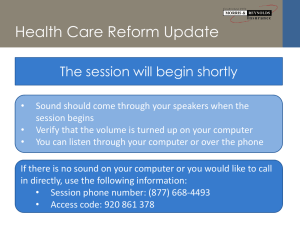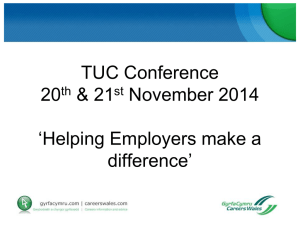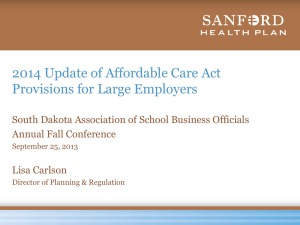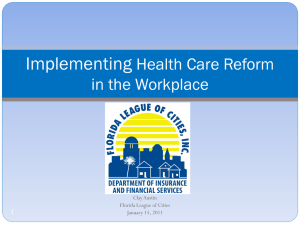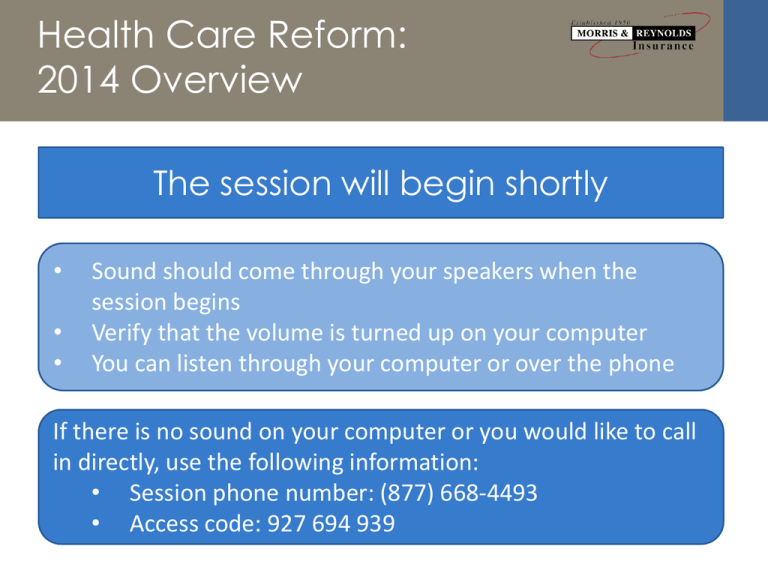
Health Care Reform:
2014 Overview
The session will begin shortly
•
•
•
Sound should come through your speakers when the
session begins
Verify that the volume is turned up on your computer
You can listen through your computer or over the phone
If there is no sound on your computer or you would like to call
in directly, use the following information:
• Session phone number: (877) 668-4493
• Access code: 927 694 939
Health Care Reform
2014 Overview
November 2013
Presented by: Erica Storm, Esq.
Becca Kopps, Esq.
Robert D. Reynolds, CIC,CPIA, AAM, AIS, AU
About the presenters
Erica Storm, Esq.
Becca Koops, Esq.
Robert D. Reynolds,
CIC, CPIA, AAM, AIS, AU
•
Employment and benefits
attorney
•
Employment and benefits
attorney
• President & CEO Morris &
Reynolds Insurance
•
Expertise in health care
reform and health plan issues
•
Primary focus: health care
reform
• Insurance & Employee Benefit’s
Broker For 30 Years
•
Educates companies on
compliance obligations
•
Creates educational materials
and compliance resources
• Certified Healthcare Reform
Expert
Webinar Logistics
Call in to
connect to
audio
We welcome your
questions at any
time!
Questions will be
addressed at the
end of the session.
•Phone number: 1-877-668-4493
•Access code: 927 694 939
Select Q&A and
choose “Send to All
Panelists” to submit
your questions.
Introduction
Health Care Reform
Affordable Care Act
• Enacted in March 2010
• Makes significant changes to health care system
• Implemented over several years
Provisions that impact:
• Health care providers
• Government programs
• Health insurance issuers
• Employers/plan sponsors
• Individuals
Most employers that offer
health plans will be
impacted in some way
How Health Care Reform Works
The Rule
Definitions
Exception
Special Rule
Special Rule
Partial
delay
More
Special
Rules
Sub-special
Rule
Additional
Special Rule
Confusing
Political
Action
Confusing
Media
Coverage
Recent Developments
Recent Guidance
•
Health FSA rollovers permitted
− Oct. 31, 2013: IRS relaxed “use-or-lose” rule for health FSAs
− Participants can carry over up to $500 in unused funds to the
next year
− Plan cannot include both carryover and grace period
− Does not impact $2,500 salary reduction limit
− Written plan amendment required
•
Cafeteria plan election change rules expanded for
health care reform changes*
•
New hardship exemption from individual mandate
penalties for Exchange enrollees*
2013 Compliance Reminders
SBC and 60-Day Notice Rule
Summary of Benefits &
Coverage (SBC)
Simple, concise explanation of plan
benefits & costs
•
Model chart available
Applies to issuers and plan sponsors
•
•
No duplication required
Issuer can distribute on behalf of
employer
Provide to participants &
beneficiaries effective Sept. 23, 2012
•
•
•
1st day of 1st open enrollment period
1st day of 1st plan year
Other specific situations
60-Day
Notice Rule
Must notify in advance of any material
modifications not in connection with
renewal
•
•
Describe in a summary of material
modifications (SMM) or updated SBC
At least 60 days BEFORE modification
becomes effective
Material modification:
•
•
•
Enhancement of covered benefits/services
Material reduction in covered benefits/
services
More stringent requirements for receipt of
benefits
Notice of Exchange
Employers subject to the FLSA must notify all employees of
Exchange/Marketplace information
Must provide in
writing
May provide by mail or
electronically (DOL
requirements apply)
Model notices
available
Compliance deadline:
New employees: within 2 weeks of hire date
Must include information about:
Existence of
Exchange and
services provided
Potential eligibility for
subsidy under
Exchange
Risk of losing employer
contribution
Notice of Exchange - Penalties
DOL has said there are no fines or penalties for failing to
provide notice
•
Still unclear whether non-compliance can
trigger:
− Non-ACA penalties
− DOL audit
− Employee lawsuits
•
Providing notice is still required by law,
and can benefit employers
− Can help answer employee questions
Health Plan Fees
Patient-Centered Outcomes
Research Institute (PCORI) Fees
•
Paid by issuers and self-funded plan sponsors
− Special rules multiple self-funded plans (including HRAs)
•
Paid annually on Form 720 by July 31 each year
− Apply for plan years ending on or after Oct. 1, 2012
− End with the 2018 plan year – do not apply for plan years
ending on or after Oct.1, 2019
•
Amount of the fees:
2012 plan year
$1 x average number
of covered lives
2013 plan year
$2 x average number
of covered lives
2014 and beyond
Increase based on
National Health
Expenditures
Reinsurance Fees
•
Transitional reinsurance program to
operate 2014-2016
− Fees imposed on health insurance issuers and
self-funded plan sponsors of major medical
plans (with some exceptions)
− Exemption expected for some self-funded plans
for 2015-2016
•
Fees based on annual national
contribution rate
− 2014: $5.25/month ($63/year) x average
number of covered lives
Nov. 15
Submit enrollment
count to HHS
Dec. 15 (or 30 days)
HHS notifies
issuer/sponsor of
amount due
30 days
Payment due
Health Insurance Providers Fee
•
Annual fee on health insurance providers
− Effective in 2014
− Due Sept. 30 each year
− Allocated according to market share: $8B in 2014 - $14.3B in
2018 (based on premium growth in later years)
Applies to:
Does not apply to:
Covered Entities
Companies with $25M or
less in net premiums
Including health insurance
issuers and HMOs
Self-insured employers
Government and non-profit
entities
VEBAs
2014 Health Plan Changes
Waiting Period Limits
•
Waiting periods limited to 90 days for all plans
− Beginning with 2014 plan year
Strict 90 day limit
• 1st of the month
following not
permitted
Other eligibility
conditions permitted
Variable hour
employees
• Can’t use to avoid
90-day limit
• Limits on
cumulative hours of
service requirement
(1200 hours/one
time only)
• Measure hours for
up to 12 months to
determine FT status
• Offer coverage by
end of 13th month
Cost-Sharing Limits for Health Plans
•
Limits for non-GF group health plans beginning with
2014 plan year
Out-ofPocket Limits
Deductible
Limits
• All non-GF group health plans
• May not exceed HDHP limits for 2014
($6,350 single/$12,700 family)
• Indexed for inflation
• Special rule for 2014 delays full
compliance
• Only insured small group non-GF plans
• May not exceed $2,000 (single
coverage) or $4,000 (family coverage)
• Carriers may have flexibility
• Indexed for inflation
Plan Changes
Annual limits eliminated
• Prohibited on essential health benefits in 2014 plan year
• Essential health benefits determined according to state
benchmark plan
Preexisting condition exclusions prohibited
• Currently prohibited for children under age 19
• Prohibited for everyone beginning with 2014 plan year
Small group policies (non-GF plans)
• Must provide essential health benefits package
• Premium rating restrictions apply – limited to age,
geographic location, family size and tobacco use
Wellness Programs Changes
•
Health-contingent wellness program reward limits
increase in 2014
− Current limit: 20% of cost of coverage
− General limit: 30% of cost of coverage
− Tobacco program limit: 50% of cost of coverage
•
Health contingent wellness programs divided into:
− Activity-only programs
− Outcome-based programs
•
Nondiscrimination rules apply to health contingent
programs (with slight differences)
− Opportunity to qualify once/year
− Must offer alternative means of qualifying
− Outcome-based programs must offer reasonable alternative
standard
Individual Mandate and
Exchanges
Individual Mandate
•
Rule for individuals: have health insurance coverage
by 1/1/14 or else (pay a penalty)
•
Penalty applies to taxpayers and their children who
don’t have “minimum essential coverage”
− Greater of dollar amount or % of income
− Kids = half of adult penalty
− Family penalty capped
•
Annual penalty amounts
− 2014 = $95 or 1%
− 2015 = $325 or 2%
− 2016 = $695 or 2.5%
What is Minimum Essential Coverage?
Employer sponsored coverage
Including COBRA and retiree
coverage
Individual coverage
Government programs
Medicare
Medicaid
Children’s Health Insurance Program
(CHIP) coverage
Some veterans’ health coverage
TRICARE
Exemptions to the Mandate
•
Available Exemptions
o Low income or hardship*
o Coverage is unaffordable
o
o
o
o
o
(more than 8% of income)
Religious exemption
Incarcerated
Member of Indian tribe or
health care sharing ministry
Not lawfully present
Short gap in coverage
•
Exemptions claimed through
Exchange or tax filing
•
Individuals who lose exemption
get special enrollment rights
Special Rule for Employees
Eligible for Non-Calendar Year Plans
Employers can
amend Section
125 plan to allow
mid-year election
changes
• Let employee elect employer coverage for Jan.
1 or leave employer plan to go to Exchange
• Optional, but plan must be amended
(retroactive amendment ok)
• Extended to any employer with a non-calendar
year cafeteria plan (not just large employers)
Relief for
employees
• Employee will not be subject to penalties if they
are not enrolled for 2013-2014 plan year
• Relief available until the end of the 2013 plan
year
American Health Benefits Exchange
Public health insurance Exchange
required by ACA
Primarily online marketplace for purchasing
health insurance (Qualified Health Plans)
Run by state or federal government with
consumer assistance from other entities
For individuals and small employers
(generally up to 50 employees)
SHOP Exchange
•
Small Business Health Option Program (SHOP) – Exchange
for small employers
2014-15
• States can
limit size to
up to 50
employees
•
2016
• States must
increase
size to up
to 100
employees
2017
• States can
let any size
employer
participate
Small employers can offer employees enrollment in a QHP
through a SHOP
− Can offer benefits through a cafeteria (Section 125) plan
− Exchange sets contribution methods
Employee-Choice Feature Delay
Employee-choice model:
• Employers have the option to offer employees all QHPs at a
certain level of coverage
• Employer chooses level of coverage and a contribution
amount
• Employees choose the plan they want
Employee choice model delayed until
2015 for FFE SHOPs
• 2014 implementation optional for state Exchanges
• Most state Exchanges will offer employee choice in 2014
Exchanges still planned to be operational
• Employers will have to choose a plan
• Employees won’t be able to choose from all plans right away
Qualified Health Plans
Offered
by an approved insurer
Certified
to meet Exchange
requirements
Offers
essential health benefits
Meets
cost-sharing limitations
Priced
like plans outside the
Exchange
Provides
Apples to apples...
bronze, silver, gold or platinum coverage
(or catastrophic plan for young individuals)
QHP Metal Levels
90% of benefit costs covered
80% of benefit costs covered
70% of benefit costs covered
60% of benefit costs covered
Exchange Eligibility
Individuals
• Citizen or legal resident
• Not incarcerated
• Reside in state covered by
Exchange
• (Not be enrolled in
Medicare)
• Separate from subsidy
eligibility rules
Small Employers
(SHOP Exchanges)
• Qualify as a small
employer based on size
• Offer QHP coverage to at
least all FT employees
• Use SHOP in primary office
location or employee’s
primary worksite location
Most individuals can shop for Exchange coverage
(even if eligible for employer coverage)
Exchange Enrollment
Restrictions apply to timing of enrollment
to prevent adverse selection
Individuals
Small Employers
• Initial enrollment:
Oct. 1, 2013-March 31, 2014
• Must enroll by Dec. 15 for
Jan. 1 coverage but:
no penalties for anyone who
enrolls during initial open
enrollment period
• Annual open enrollment:
Oct. 15-Dec. 7
• Special enrollment for
qualifying events
• Can buy coverage for
employees any time after
Oct. 1, 2013
• 12 month plan year required
• Annual election periods
apply
• Special enrollment for
employees with qualifying
events
Exchange Subsidies
Provide assistance to low income individuals:
• 100%-400% of federal poverty level
• Not eligible for government programs that cover
health care
To help pay premiums or reduce cost-sharing
Not available to individuals who are:
• Eligible for affordable, minimum value employer
coverage or
• Enrolled in an employer plan
Employer Mandate
(Delayed Until 2015)
Employer Shared
Responsibility Rules (Pay or Play)
Small Employers
(fewer than 50
FT/FTE
employees)
• No requirement to offer coverage
• Can get tax credits for providing
coverage
Large Employers
(50+ FT/FTE
employees)
• Must offer coverage to FT employees
and dependents to avoid penalties
• Coverage must be affordable and
provide minimum value
• Penalties delayed until 2015
Employer penalties triggered if any full-time employee
receives subsidized coverage in an Exchange
Determining Large Employer
Status for Pay or Play Penalties
Who is a Large Employer?
Average 50+ fulltime employees
In the prior
calendar year
Including full-time
equivalent
employees
Common ownership rules apply
Special rule for 2014: can count 6 consecutive months in 2013
Will this apply for new 2015 effective date?
Full-Time Employee
With respect to a calendar month
An employee who is employed on
average at least 30 hours of
service per week
130 hours of service in a calendar
month = the monthly equivalent of
30 hours of service/week
Full-Time Equivalent Employees
Add hours of
service in a month
for PT employees
(up to 120
hours/person)
Divide total hours
by 120
Result: Number of
FTEs for the month
Counting Employees
Add full-time employees (including seasonal) for each
calendar month in prior calendar year
Add FTEs (including seasonal) for each calendar month in
prior calendar year
Add full-time employees and FTES together for each month
of prior calendar year
Add 12 monthly totals and divide by 12
* Special rule for 2014: can use 6 consecutive months in 2013
Special Rules
Seasonal Employees
An employer is not a large employer if:
(1) the employer's workforce exceeds 50 fulltime employees for 120 days (4 months) or
fewer during the calendar year and
(2) the employees in excess of 50 employed
during that period were seasonal workers
New Employers
Use average number of full-time
employees the employer is “reasonably
expected to employ” on business days
in the current calendar year
Providing Coverage to FullTime Employees
Employer Shared
Responsibility Penalties
Penalties may apply if the employer:
• Fails to offer minimum essential coverage to FT
employees (and dependents)
• Offers coverage that is not affordable or does not
provide minimum value
Penalties triggered if any FT employee gets
subsidized coverage through Exchange
• Not offered employer coverage or offered coverage that is
unaffordable not of minimum value (and doesn’t enroll)
• Not eligible for government programs (Medicare, Medicaid)
• Income below 400% of federal poverty level
Enrolling in Exchange coverage without subsidy will not trigger penalties
Affordability and Minimum Value
Affordable Coverage
• Employee’s cost for self-only
coverage does not exceed 9.5%
of household income
• Employer can generally compare
cost of coverage to W-2 income,
rate of pay or federal poverty level
Minimum Value Coverage
• Plan covers at least 60% of
costs of covered benefits and
services for average person
• HRA/HSA amounts may be
included
• HHS-approved methods for
calculation
• Some HRA amounts may
be included
• Most wellness incentives
cannot be taken into
account
Potential Penalties
Penalty A
• Employer did not offer coverage to substantially
all FT employees and dependents (children)
• $2,000 x (all FT employees – 30)
Penalty B
• Employer offered coverage to substantially all FT
employees/dependents
• But not all OR coverage is not affordable or does
not provide minimum value
• $3,000 x each employee who gets subsidized
coverage (capped at Penalty A amount)
Penalty Potential
Not a large
employer:
Less than 50
full-time
equivalent
employees
Large employer: 50 or more full-time equivalent employees
Does not offer coverage to
substantially all FT employees (and
dependents)
Scenario A
No full-time
employees
receive credits
for exchange
coverage
No penalty
No penalty
Offers coverage to substantially all FT employees (and
dependents)
Scenario B
1or more full-time
employees
receive credits
for exchange
coverage
Scenario C
No full-time
employees receive
credits for exchange
coverage
Number of fulltime employees
minus 30
multiplied by
$2,000
No penalty
Scenario D
1or more full-time employees
receive credits for exchange
coverage
Lesser of:
Number of full-time employees
minus 30, multiplied by $2,000.
Number of full-time employees
who receive credits for
exchange coverage, multiplied
by $3,000.
(Penalty is $0 if employer has 30
or fewer full-time employeesbecause penalty is based on
the lesser of the two
calculations)
49
Offering Coverage
•
Must be offered to substantially all FT
employees and dependents
•
Substantially all
•
Children up to age 26 must be offered
coverage
− 95% general rule
− May fail to offer to up to 5% (or 5, if greater)
− Does not have to be inadvertent
− Not spouses
− Dependent coverage does not have to be
affordable
•
Opportunity to elect must be offered
once per year
− Employee must be able to opt out of
coverage that is unaffordable/not MV
Measuring Full-Time Status
Statutory Requirement
•
Employers would have to determine full-time status on
a monthly basis
− Would have to know status to offer coverage
•
Administrative issues
− Not an issue for employers/employees with standard schedules
− Problematic for variable hour employees
Employees Expected to
Work Full-Time
•
Employer must offer coverage by the end of
the first 3 full calendar months of employment
•
Applies to an employee who is “reasonably
expected at his or her start date to be a fulltime employee (and is not a seasonal
employee)”
•
If coverage is not offered by the
deadline, penalties can apply for:
− The first 3 calendar months
− Any subsequent months where
coverage is not offered
Safe Harbor for Variable
Hour/Seasonal Employees
Measurement Period
Counting hours of service (3-12 months)
Administrative Period
Time for enrollment/disenrollment (Up to 90 days)
Stability Period
Coverage provided (or not) – length depends on type of
employee and whether FT or not
Look Back Measurement Method
2013
Nov. 1
Dec 31
Measurement Period
2014
Jan 1
Nov. 1
Measurement Period cont.
Dec 31
Admin Period
2015
Dec 31
Jan 1
Stability Period
Questions?
For more information about Health Care Reform visit: www.morrisandreynolds.com/health-reform/
Morris & Reynolds Insurance
14821 South Dixie Highway, Miami, FL 33176
Telephone 305.238.1000 | Fax 305.255.9643
Thank you!
This presentation is current as of the date presented and is for informational purposes only. It is not intended to be
exhaustive nor should any discussion or opinions be construed as legal advice. Please contact legal counsel for legal advice on
specific situations. This presentation may not be duplicated or redistributed without permission. © 2012-2013 Zywave, Inc.
All rights reserved.


